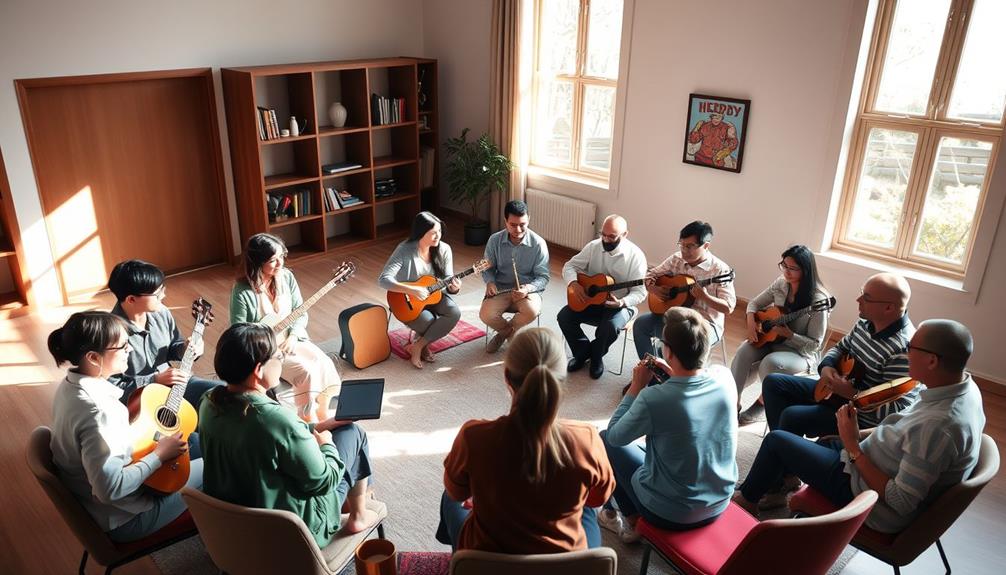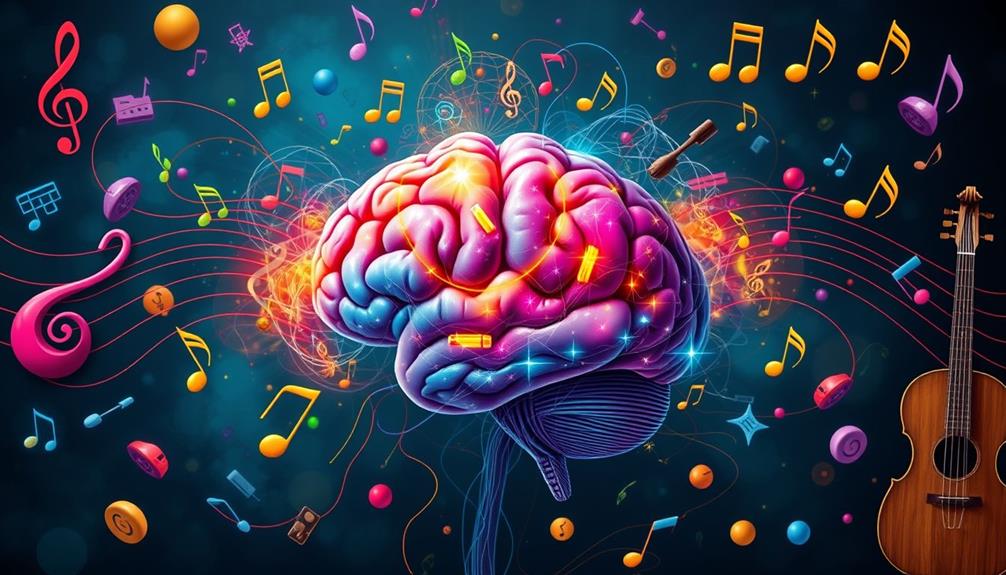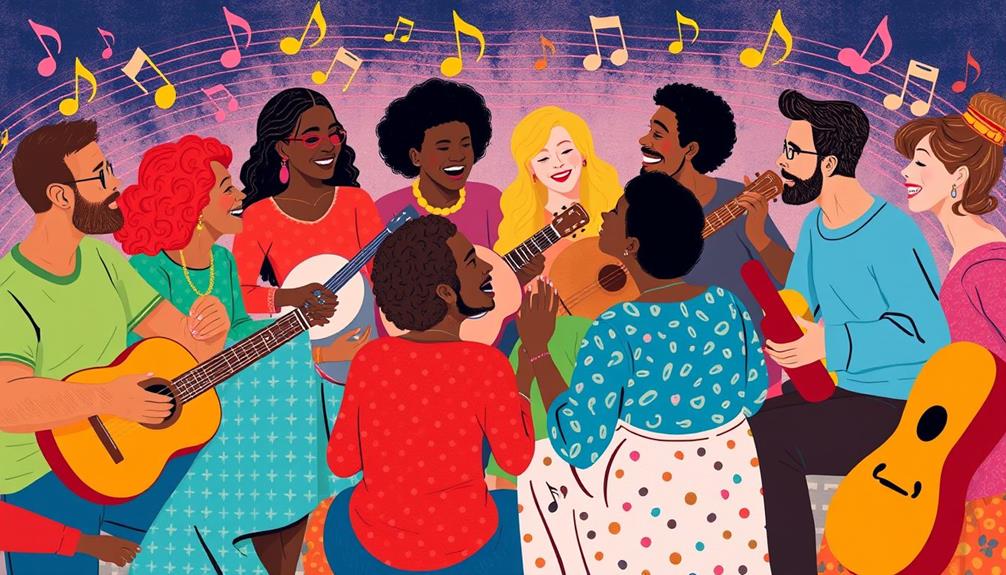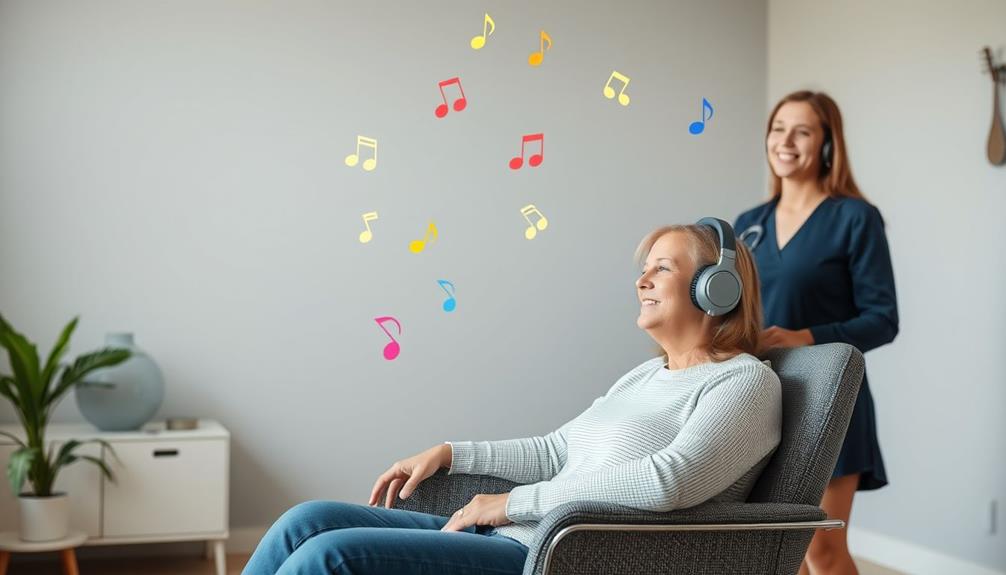Using music can markedly boost your communication skills. Start by incorporating familiar melodies into your daily routine to help process instructions and enhance memory. Singing can express emotions you might struggle to articulate, making connections deeper. Engage in collaborative music-making, as it fosters empathy and improves interpersonal dynamics. You can also try rhythmic activities, which strengthen attention and comprehension. Additionally, using songs as learning tools can enhance vocabulary and pronunciation. So, as you explore these practical tips, you'll uncover even more ways music can transform your communication abilities.
Key Takeaways
- Utilize familiar melodies in routines to enhance children's ability to follow directions and process information effectively.
- Engage in group singing to foster empathy and emotional understanding among participants, improving overall communication skills.
- Incorporate rhythmic activities like clapping or drumming to strengthen auditory and motor connections, enhancing memory and communication.
- Use music therapy techniques to articulate complex emotions, helping individuals express feelings that are challenging to verbalize.
- Pair visual cues with sung instructions to create stronger cognitive connections, improving comprehension and attention during communication.
The Science of Music and Communication
Music's power as a communication tool lies in its ability to convey emotions and ideas that words alone often can't express. You might find it fascinating that around 90% of the global population engages with music, showcasing its essential role in interpersonal communication.
The overlapping neural substrates between music and language enhance how we connect with one another, allowing for emotional and cognitive exchanges that transcend verbal language. Additionally, exploring AI in music creation can provide insights into how technology influences the ways we express ourselves musically.
Engaging in music therapy can considerably improve your communication skills. Joint music-making not only fosters social bonds but also encourages precise temporal coordination and empathetic attunement. These elements work together to enhance overall communication dynamics, whether in personal relationships or group settings.
Moreover, research using neuroimaging techniques like hyperscanning reveals real-time neural interactions during musical exchanges. This insight into cognitive and emotional processes highlights the effectiveness of musical communication.
Especially during early development, music helps infants respond to stimuli, enhancing their emotional and communicative capacities. By recognizing music's unique ability to convey feelings and ideas, you can harness its power to improve your interactions and deepen your connections with others.
Music's Impact on Language Development

The influence of music on language development is profound, particularly in young learners. When you incorporate music into their daily routines, you enhance their cognitive processes, improving memory retention and vocabulary development. Children often pick up melodies before they can form sentences, making singing familiar songs a powerful tool for boosting language skills.
Additionally, utilizing essential tools for creating enchanting music tracks can further enrich the learning experience by providing diverse auditory stimuli that engage young minds.
Even adults can benefit from music in foreign language learning. By engaging with songs, you can improve pronunciation and comprehension of new vocabulary, creating a more enjoyable learning experience.
Musical communication starts from infancy, where rhythm and sounds play crucial roles in early language development and social interaction.
For children with receptive language disorders, music-related activities can transform how they understand verbal instructions. By using melodic cues, you can make learning more accessible and enjoyable.
Therapeutic Uses of Music

Integrating music into therapeutic practices can greatly enhance communication skills, building on its role in language development. Music helps young children develop both verbal and nonverbal communication through structured activities, much like how animated films often evoke strong emotional responses that foster connection and understanding.
Here are a few ways it can make a difference:
- Singing Slow Songs: This can reduce stuttering by over 90%, improving fluency and clarity in speech.
- Engaging in Musical Activities: These activities activate multiple brain areas related to language processing, leading to better receptive and expressive language skills.
- Combining Music with Movement: This enhances attention and focus, making it easier for children to understand and follow verbal instructions.
- Using Familiar Melodies: These help children follow directions more easily by creating cognitive connections that enhance memory and comprehension.
Enhancing Memory With Music

When you tap into the power of music, you can notably boost your memory retention and cognitive abilities. Engaging with familiar songs enhances your brain's capacity to retain complex information. This happens because music activates multiple brain areas related to language and communication, making it easier for you to process and recall details.
For instance, similar to how setting realistic weight loss goals can enhance motivation, incorporating music into learning can keep you motivated and engaged.
Singing songs or turning educational material into melodies can considerably improve your vocabulary and memory. By associating lyrics with melodies, you create stronger mental links that aid in recall. For instance, if you transform poems into songs, you'll find that memorizing the content becomes much simpler.
Additionally, activities like clapping or drumming along to a song reinforce your memory by strengthening auditory and motor connections in your brain. These rhythmic patterns grab your attention and enhance your processing capabilities, which is essential for effective verbal communication.
Emotional Connections Through Music

Music speaks a powerful emotional language that connects you to others in profound ways.
It can create a sense of community, much like reviving old friendships through shared experiences. When you share musical experiences, whether through performance or listening, you strengthen your bonds and create lasting memories together.
Plus, singing allows you to express feelings that might be hard to put into words, making it a unique tool for communication.
Music as Emotional Language
The power of music as an emotional language lies in its ability to forge deep connections between individuals, transcending the limitations of spoken language. When you engage with music, it can evoke a spectrum of emotions, allowing for profound social experiences that enhance communication.
Music can also serve as a form of non-verbal expression, similar to the way gentle yoga stretches can help alleviate physical discomfort and promote relaxation before bedtime gentle yoga stretches.
Consider how music:
- Activates emotional processing regions in your brain, helping you feel and express complex emotions.
- Reveals autobiographical memories, providing a pathway for sharing personal stories, especially for those with dementia.
- Enhances empathetic attunement when making music together, strengthening social bonds.
- Modulates emotions more effectively than speech, particularly in infants, highlighting its role in early emotional communication.
Shared Experiences and Bonding
Engaging in musical activities creates opportunities for shared experiences that deepen emotional connections. When you play together, whether in a group singing session or an ensemble performance, you're not just making music; you're also building social bonds.
These joint activities connect people through a collective emotional journey, allowing everyone involved to experience a range of feelings in unison. Research shows that cats can recognize their owner's voice, highlighting the importance of communication and emotional connection in both humans and animals.
Music's ability to evoke shared emotional experiences enhances relationships, fostering empathy and understanding among participants. As you navigate social dynamics through these musical moments, you'll likely find your ability to manage conflicts improves as well.
The cultural context of the music you share can also enrich these connections, as different traditions bring unique narratives and identities into the mix.
Moreover, engaging in music activates emotional processing regions in the brain, revealing autobiographical memories that further strengthen bonds. By sharing musical narratives, you create deeper connections with those around you.
Ultimately, the act of making music together not only enhances communication skills but also cultivates lasting emotional ties that can positively impact various aspects of your life.
Expressing Feelings Through Song
Through melodies and lyrics, you can express emotions that might be hard to put into words. Music acts as a powerful medium for expressing feelings, allowing you to tap into your deepest emotions. When you engage in expressing feelings through song, you create emotional connections that can bridge communication challenges.
Incorporating auditory discrimination exercises can further enhance your ability to convey these emotions effectively, as it sharpens your sound recognition skills and supports your overall communication abilities aiding in expression.
Consider how music can help you:
- Uncover feelings of joy through upbeat tunes that lift your spirits.
- Channel sadness with poignant lyrics that resonate with your experiences.
- Share love through romantic ballads that articulate your affection.
- Invoke nostalgia with melodies that transport you back to cherished memories.
Singing or sharing songs can enhance your emotional expression, making it relatable and impactful. Additionally, participating in group singing or songwriting can strengthen your connections with others, fostering empathy and understanding.
If you face communication challenges, music therapy can be an effective tool, helping you articulate your emotions and improve emotional awareness. By engaging with music from an early age, you not only build emotional literacy but also enhance your overall communication skills, enriching your interactions with others. It encourages self-expression in a safe and creative way, allowing individuals to convey thoughts and feelings that might be difficult to put into words. The role of music in therapy extends beyond emotional expression, fostering deeper connections between people and promoting understanding in relationships. As a universally understood medium, music bridges communication gaps, making therapy more accessible and impactful for individuals of all ages.
Practical Tips for Musical Engagement

Music offers a unique opportunity to enhance communication skills, making it easier to engage children in meaningful ways. Incorporating familiar tunes into daily routines not only helps children process and follow directions more effectively but also mirrors the way certain zodiac signs are viewed as more appealing socially.
Use singing during shifts; it can greatly boost engagement and attention. When you combine visual cues with sung instructions, you strengthen cognitive connections and support language processing.
Encourage movement alongside music. Dancing or simple physical activities while listening can enhance focus and comprehension. This active engagement helps reinforce the message you're conveying.
Frequently Asked Questions
How Can Music Improve Communication Skills?
Music enhances your communication skills by activating brain areas linked to language, boosting engagement, and reinforcing cognitive connections. Singing and rhythmic activities improve attention, listening, and memory, making it easier for you to express yourself effectively.
How Can You Use Music to Communicate?
You can use music to communicate like a maestro conducting a symphony! Sing familiar tunes, add movement, and use catchy melodies to make instructions memorable. It turns learning into a joyful experience, boosting everyone's engagement and understanding.
How Does Music Therapy Help Communication?
Music therapy helps communication by engaging multiple brain areas, enhancing attention and comprehension. Through singing and rhythm games, it encourages turn-taking and listening skills, ultimately improving vocabulary and expressive language for individuals facing communication challenges.
How Is Music Used as a Tool to Spread Messages?
Think of music as a bridge, connecting hearts and minds. It spreads messages by uniting communities, evoking emotions, and enriching storytelling, making complex ideas more relatable and memorable, while inspiring action and awareness in social movements.
Conclusion
Incorporating music into your life can transform your communication skills like a well-tuned instrument harmonizing with a melody. Just as a musician learns to listen and respond to each note, you can sharpen your ability to connect with others. Research shows that engaging with music boosts brain function and emotional intelligence. So, next time you hear a song, let it guide your conversations, creating a symphony of understanding and connection that resonates with those around you.










